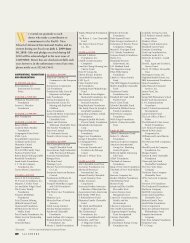Download Current Issue - SAIS
Download Current Issue - SAIS
Download Current Issue - SAIS
Create successful ePaper yourself
Turn your PDF publications into a flip-book with our unique Google optimized e-Paper software.
new geography of power. On the bottom<br />
of the pyramid are the most deprived,<br />
the 1 billion who go to bed hungry every<br />
night. Here, food security is equivalent<br />
to hunger. In 22 countries, including<br />
Bangladesh, Ethiopia, Haiti, Sierra<br />
Leone and Somalia, food is not a matter<br />
of power and weakness but of life and<br />
death. However, in this new geopolitical<br />
landscape, there are actors who own<br />
different resources and apply distinctive<br />
strategies to advance their position.<br />
In some countries, demand outstrips<br />
supply, and it is physically impossible to<br />
move the frontier of production farther<br />
out. Because of lack of land or water,<br />
countries in Asia (China, India, Japan,<br />
Malaysia and South Korea) and the<br />
Middle East (Bahrain, Jordan, Kuwait,<br />
Qatar, Saudi Arabia and the United Arab<br />
Emirates) have no way of keeping up<br />
with increased domestic demand.<br />
Leaders know agricultural shortages<br />
or food inflation are directly linked to<br />
social unrest and to potential regime<br />
breakdown. Protests for specific grievances<br />
can snowball into massive civil<br />
unrest, as the 2011 Arab revolutions<br />
seemed to confirm. Coupled with rising<br />
protectionism since the 2008 financial<br />
crisis, governments in these countries<br />
are quickly deeming trade insufficiently<br />
secure to provide for their populations.<br />
In consequence, they are grabbing land<br />
for food security. Although the means<br />
vary—acquiring grain elevators, adopting<br />
specific production agreements or<br />
leasing land—the strategic aim is the<br />
same: to secure supplies in the face of<br />
renewed competition.<br />
56 <strong>SAIS</strong>PHERE<br />
The controversial issue is that many<br />
of these agreements are made by stateowned<br />
companies, essentially creating<br />
foreign enclaves in producing countries.<br />
Local hostility toward “land grabs” is the<br />
rule, not the exception. In 2007, the public<br />
outcry about the China-Philippines<br />
2.5-million-acre lease for crops that<br />
would be shipped directly forced Manila<br />
to backtrack. In 2009, the government of<br />
Madagascar was toppled after it leased to<br />
Daewoo Logistics Corp., a South Korean<br />
company, half the island’s arable land for<br />
export production. How would Beijing<br />
react if, for example, the Argentine government<br />
imposed a total export ban on<br />
crops, in effect revoking the terms of an<br />
already signed lease? Should suppliers<br />
fail to comply, the only way to enforce<br />
such contracts would be through the use<br />
of retaliation or coercion.<br />
Then there are those who produce<br />
more than they consume. For agricultural<br />
producers, surplus is power. In<br />
a world that demands ever-increasing<br />
amounts of agricultural products, countries<br />
with vast extensions of fertile land<br />
and abundant freshwater resources have<br />
the upper hand. This is by no means a<br />
coordinated group, coalition or bloc. It<br />
constitutes by its very nature a heterogeneous<br />
grouping: Not all countries produce<br />
the same food commodities.<br />
Soybean Is King<br />
Soybeans are arguably the most essential<br />
input in the global food system.<br />
They are a highly efficient crop: About<br />
40 percent of the calories in soybeans<br />
are derived from protein, compared to<br />
25 percent for most other crops. This<br />
means the return per dollar spent is<br />
relatively high compared to other oilseed.<br />
For the poor, soy is an essential<br />
component of any dietary energy supply<br />
intended to inexpensively cover daily<br />
calorie requirements. For the better off,<br />
the crop is a cornerstone fodder component.<br />
And because livestock can be<br />
fed more efficiently with soybean-based<br />
feed, the massive spread of the crop has<br />
made chicken, beef and pork cheaper<br />
and more readily available worldwide.<br />
The biggest soybean producers in the<br />
world are the United States and South<br />
America; Argentina, Brazil and Paraguay<br />
combined account for half of total world<br />
exports. Demographic and environmental<br />
factors are projected to increasingly<br />
make buyers more dependent and South<br />
American sellers more competitive in<br />
the international agricultural market.<br />
Just as the rise of American economic<br />
might was made possible by a steady,<br />
secure supply of oil from the Middle<br />
East, the rise of China necessitates soybeans<br />
from South America.<br />
Assuming that relative scarcities continue<br />
to deepen and move the world into<br />
a new age of geopolitical competition,<br />
agricultural resources will be at the forefront<br />
of a global power struggle for food<br />
security. In the oil geopolitics of the 20th<br />
century, countries such as Bahrain, Iran,<br />
Iraq, Kuwait, Oman, Qatar, Saudi Arabia<br />
and the United Arab Emirates became<br />
strategically relevant for U.S. foreign<br />
policy. Will the rising powers of the 21st<br />
century define core strategic interests in<br />
South American food production?<br />
If the 21st century is more about<br />
soil than oil, then Argentina, Brazil,<br />
Paraguay and Uruguay might become<br />
the geopolitical equivalent of the Persian<br />
Gulf countries. To what extent will<br />
Chinese foreign relations with Latin<br />
American agricultural exporters resemble<br />
the ones between the United States<br />
and Middle Eastern oil exporters? The<br />
answer to these questions will go far<br />
beyond <strong>SAIS</strong>’s “Year of Agriculture.” n<br />
Mariano Turzi ’07, Ph.D. ’10 is a<br />
professor in the Department of Political<br />
Science and International Studies at<br />
Torcuato Di Tella University in Buenos<br />
Aires, Argentina.



